Yes, removing bees for free is possible; dive into our article to discover intriguing options that could save both your wallet and the ecosystem.
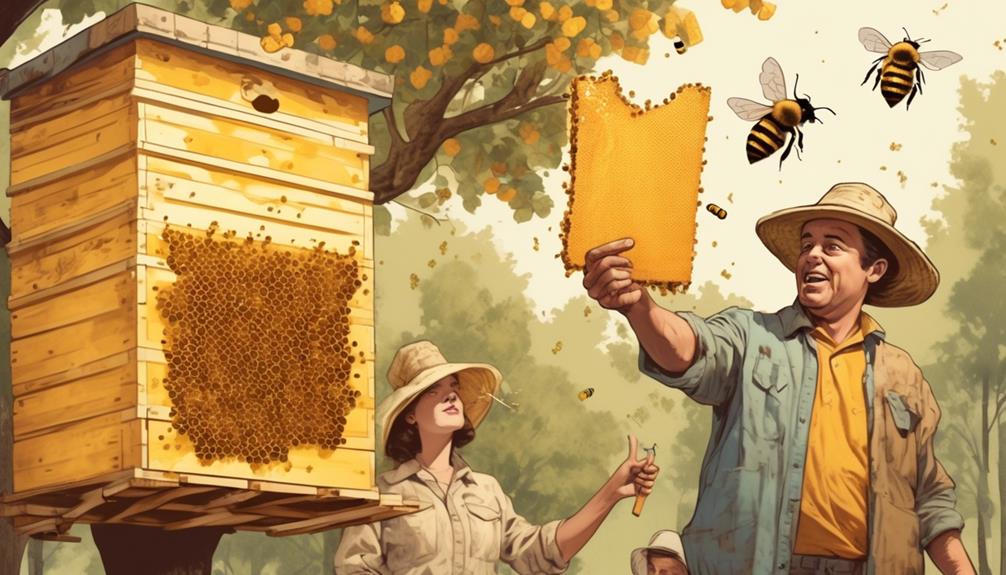
Can You Get Bees Removed for Free?
Imagine this: you're sipping your morning coffee when a soft buzz fills the air, turning your peaceful moment into an anxious vigil for an uninvited swarm of bees. You're torn between the desire to keep your home safe and the knowledge that bees play an essential role in our ecosystem.
Perhaps you're wondering, can these buzzing guests be safely removed without costing you a dime? As we explore the various options and scenarios, you might just find the answer to this pressing question more intriguing than you initially thought.
Key Takeaways
- Bees are essential for pollination and the production of fruits, seeds, and vegetables.
- Bee populations are declining due to various factors, posing a threat to our food supply and biodiversity.
- DIY bee removal can be risky and may result in colony damage, property damage, and attracting new swarms.
- There are options for free bee removal, such as contacting local beekeepers, government agencies, pest control companies, or universities with entomology departments. However, availability may vary depending on the circumstances.
Understanding the Importance of Bees
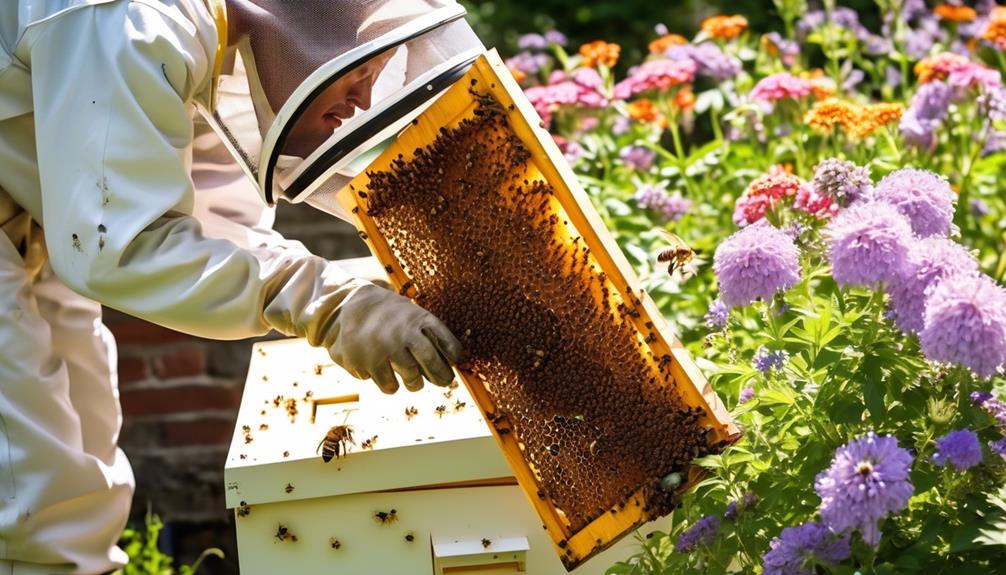
Before delving into bee removal methods, it's crucial to understand why bees are an integral part of our ecosystem and the serious implications of their decline. Bees, as primary pollinators, play an indispensable role in the propagation of various plant species. They help in the fertilization process by transferring pollen from the male stamen to the female pistil of a flower. This pollination leads to the production of fruits, seeds, and vegetables, vital for human consumption and the survival of other species.
Sadly, bee populations are experiencing a significant decline worldwide, an alarming trend linked to factors like habitat loss, pesticide exposure, disease, and climate change. This die-off threatens not only our food supply but also the biodiversity of our planet. Imagine a world without the various plant species that bees help propagate – it's a grim picture.
Risks of DIY Bee Removal

While appreciating the crucial role bees play in our ecosystem, it's equally important to consider the risks involved in attempting to remove a bee colony from your property on your own.
Firstly, there's the immediate risk of stings. Bees, particularly Africanized honey bees, tend to become aggressive when their colonies are disturbed, leading to multiple, painful stings that could induce allergic reactions.
Secondly, you could inadvertently damage the colony, causing the bees to abandon it. This can lead to a phenomenon known as 'robbing,' where other bees or pests invade the abandoned hive, leading to a possible infestation.
Moreover, improperly removed honeycombs can melt, causing damage to your property structures. Furthermore, the scent of an old hive can attract new swarms, making your initial efforts futile.
Lastly, handling bees also requires technical knowledge and experience. Bees play an integral role in pollination, and a mishandled removal can disrupt local ecosystems.
Free Bee Removal Options
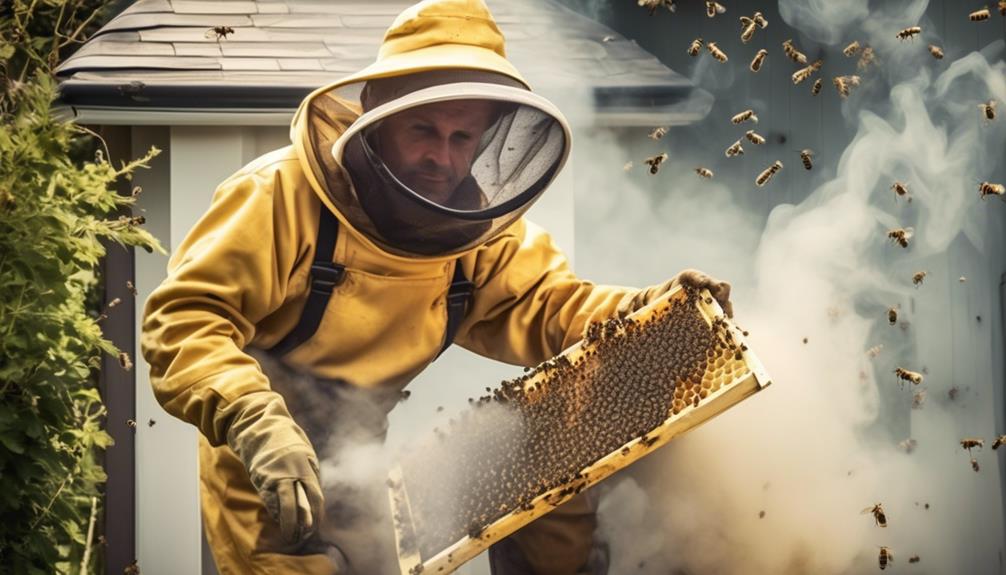
Despite the risks, numerous viable options exist for getting bees removed from your property at no cost, while ensuring their survival and continued contribution to the ecosystem. One such option is contacting local beekeepers or beekeeping associations. They're often willing to relocate hives voluntarily, eager to expand their colonies or replace lost ones. You're not only solving your problem but also supporting local beekeeping efforts.
Another path is reaching out to your local government. Some municipalities offer free bee removal services as part of their pest control or wildlife management programs. They'll typically bring in professional beekeepers to safely remove the bees without harming them.
Furthermore, certain pest control companies offer free bee removal if the hive is easily accessible and the bees are a species that they're interested in, such as honey bees. You'll need to check with individual companies as this isn't a universal service.
Lastly, universities with entomology departments may be interested in the bees for research purposes. They might remove the bees for free and give you the added satisfaction of contributing to scientific research. Remember, all these options aim at preserving these vital pollinators, so it's a win-win situation for all.
Professional Bee Relocation Services
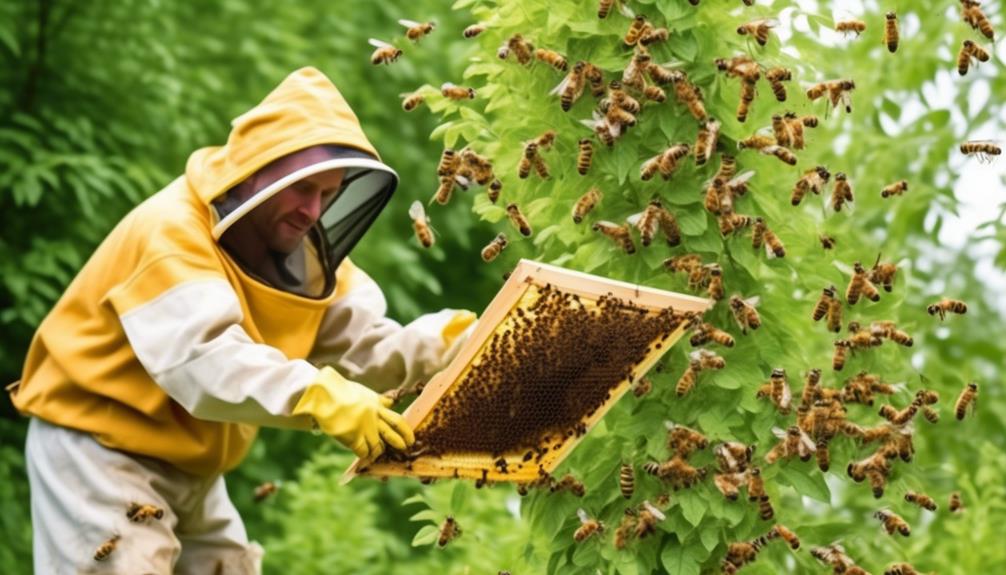
In the realm of professional bee relocation services, you'll find that experts use specific techniques and equipment to safely and efficiently move bee colonies, minimizing harm to the bees and disruption to your property. These professionals utilize specialized suits for protection against bee stings, smokers to calm the bees, and bee vacuums to gently collect the bees.
Subsequently, the collected bees are transported in secure containment units to an apiary or another suitable location. This process is often done at dusk or dawn when bees are less active, to ensure minimal disturbance and maximum success.
You'll also discover that these experts adopt a meticulous approach when dealing with bee nests within structures. They carefully open up the infested area, remove the bees, clean and treat the space to deter future colonies, and then skillfully repair the structure to its original state.
Thus, professional bee relocation services provide a comprehensive solution that not only addresses your current bee problem but also helps prevent future infestations. While it may not be a free service, the peace of mind and assurance of a job well done are often worth the expense.
Circumstances for No-Cost Bee Removal
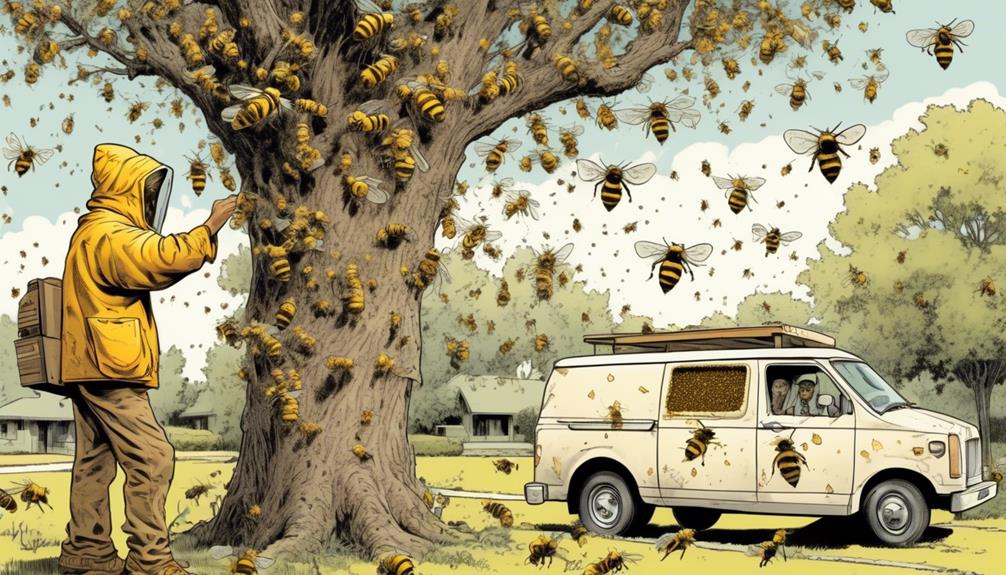
Navigating the complex world of honeybee removal, you might wonder if there are circumstances where this service could be performed at no cost. Indeed, there are specific situations where this might be possible.
One such situation is when you're dealing with a local swarm that's recently arrived and hasn't yet established a hive. In these cases, local beekeepers might be willing to collect the swarm for free, as they can benefit from the additional bees in their colony.
Another instance where no-cost removal might be applicable is if your property is home to a rare or endangered bee species. Certain conservation organizations may undertake the removal process at no charge to ensure the bees' safety.
However, it's critical to know that free removal services aren't always available and often depend on the particular circumstances, such as the location and accessibility of the hive. Additionally, such arrangements often require a level of patience and flexibility on your part.
Frequently Asked Questions
What Are the Legal Implications of Removing Bees From Your Property?
Removing bees from your property can have legal implications. You're required to check local ordinances, as some areas protect certain bee species. You mustn't harm bees, especially if they're endangered.
It's advisable to hire a professional beekeeper or pest control service. They'll ensure legal procedures are followed, preventing fines or penalties.
Always remember, bees play a crucial role in our ecosystem, so it's important to handle removal in a humane and legal way.
Can Honey Be Harvested During the Bee Removal Process?
Yes, you can harvest honey during the bee removal process. However, it's not as simple as it sounds. You must have a deep understanding of bee behavior and biology to ensure you don't harm the bees or yourself.
Furthermore, you'll need specialized equipment, such as a bee suit, smoker, and honey extractor.
Lastly, be mindful of local regulations about honey harvesting.
Always prioritize the bees' welfare over the potential honey yield.
Are There Any Preventive Measures to Avoid a Bee Infestation?
Absolutely, there are several preventive measures you can take to avoid a bee infestation.
You should regularly inspect your property for signs of a hive or swarm.
Seal any small holes or cracks in your home's exterior to prevent bees from entering.
Also, avoid leaving sweet foods or drinks outside which can attract bees.
Regularly trim vegetation and remove potential hive locations.
How Can We Identify the Species of Bees Present in Our Property?
To identify the species of bees on your property, you'll need to observe their physical characteristics and behavior. Look at their size, color, and the presence of any distinctive markings. Also, note whether they're solitary or live in colonies, and their preferred nesting places.
It's a bit technical, but there are online guides that can help. If you can't determine the species yourself, you might want to contact a local beekeeper or pest control service.
What Are the Environmental Impacts of Bee Removal?
Bee removal can have significant environmental impacts. When you remove bees, you're potentially disrupting pollination, which plants rely on for reproduction.
Additionally, bees contribute to biodiversity, a key factor in healthy ecosystems. Mismanaged removals can also harm bee populations.
It's essential to use responsible methods that relocate bees instead of killing them. Remember, a balanced environment needs bees.
Conclusion
In conclusion, bees play a pivotal role in our ecosystem, making their safe removal crucial. DIY methods pose risks, so consider free removal options or professional services.
While free removal isn't always available, certain circumstances may qualify you for no-cost bee removal. Stay informed and make decisions that prioritize our environment and personal safety.
Remember, the goal isn't merely getting rid of bees, but shifting them to a more suitable location.


